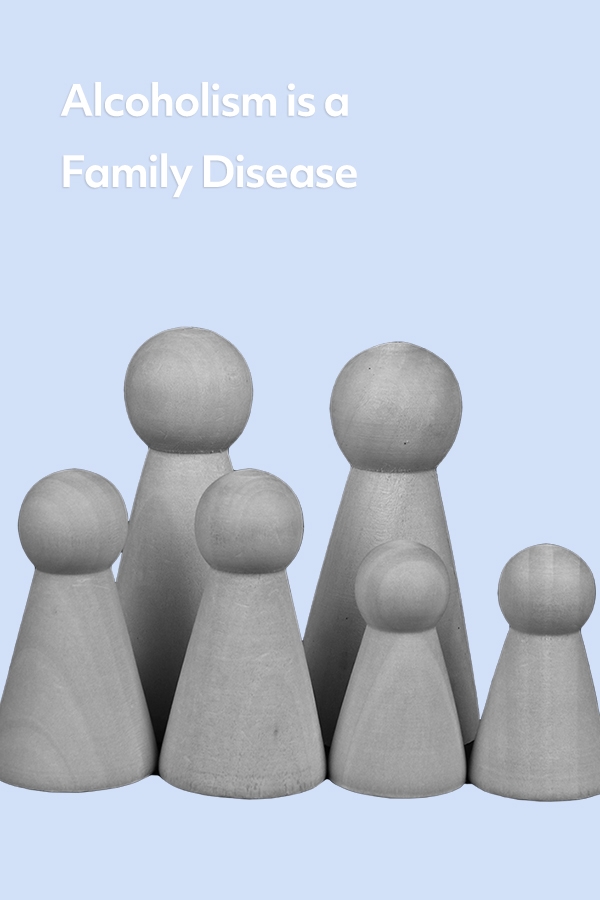Alcoholism affects the entire family.
When I was drinking, one of the lies I told myself was, “I’m not hurting anyone but myself.” I’ve heard the same from many other people with alcohol use disorder (AUD). But no matter how many times we say it or how hard we try to believe it, it’s just not true. AUD doesn’t only impact the person with the bottle in their hand—it affects everyone in the family mentally, emotionally, and sometimes physically.
Here is some of what we mean when we say that AUD or alcoholism is a family disease:
Kids struggle when there is alcoholism in the family
According to the National Institutes of Health, more than one in ten children in the U.S. lives with a parent with AUD. The same report states that 414,000 adolescents between the ages of 12-17 have AUD, meaning that many children also live with a sibling who has it. What effect can living with family members who have AUD have on children?
One very common consequence of AUD is increased instability and disruption. Chronic alcohol use affects brain function. The consequences of this can be far-reaching, but one aspect is that a person with active AUD is often less predictable and less reliable. This may not sound like a serious issue, but instability in kids’ lives is actually a big deal! Instability is a stressor that can lead to behavior problems, learning difficulties, social problems, and mental health issues that could follow them into adulthood. These deep-seated problems are the reason that support groups like the 12-step program Adult Children of Alcoholics exist. Also, many children whose family members have AUD feel they must lie and hide the family’s problems from others, leading to a sense of shame or guilt. Or they may take on responsibilities far too heavy for them, trying to fill the role of the person who is drinking.
Even if a person tells themselves (like I did) that their alcohol use doesn’t have consequences for their kids, people with AUD are often preoccupied with alcohol to the point that it distracts from day-to-day life. It’s difficult to be emotionally and mentally present for a child when one is focused on getting the next drink. And when a child feels unimportant to their family members, they can internalize that in ways that affect their self-esteem for years to come.
Alcoholism has an impact on romantic relationships
When one partner has AUD—or even just drinks heavily—it can put serious stress on the relationship. Heavy drinking by one partner is strongly correlated with arguments, lowered satisfaction in the relationship, and break-ups or divorce. Alcohol use is also often tied to infidelity, financial difficulties, and domestic violence, all of which are obviously major stressors to any relationship.
In some relationships in which one person has AUD, their partner will try to pick up the slack. This can lead to unequal partnerships in which the non-drinking partner shoulders more than their share of responsibilities. The fallout from this is often resentment, toxic behaviors and thoughts, and unhealthy patterns that enable the partner with AUD to keep drinking.
This might sound like the solution is for both partners to drink together. Unfortunately, that often just speeds up the progression of the disease of AUD. Then both partners may be facing the same consequences to their health, jobs, social standing, mental wellness, and finances.
There is support for families dealing with AUD
If there is one silver lining in the fact that alcohol use disorder is so prevalent, it is that support and help options are also numerous. Here are a few of the options available to assist families suffering from AUD:
- ALANON: A 12-step-based support group for anyone impacted by addiction.
- Alateen: A 12-step recovery support group for teens impacted by addiction.
- SMART Friends & Family: An alternative to 12-step programs, SMART provides effective and easy-to-learn tools to help you and your family.
- Learn to Cope: A support network offering education, resources, and peer support for family members of those with substance use disorders.
- GRASP: A support group for those struggling with grief after losing a loved one to addiction.
- Parents of Addicted Loved Ones: A Christian organization that provides education and support to parents.
- Adult Children of Alcoholics: A 12-step group for the adult children of those struggling with addiction.
Alcoholism can disrupt and dominate family life, but it doesn’t have to! If you have AUD or just feel like you’re drinking too much, you can get help—for yourself and your family. All of you deserve the chance to recover!









